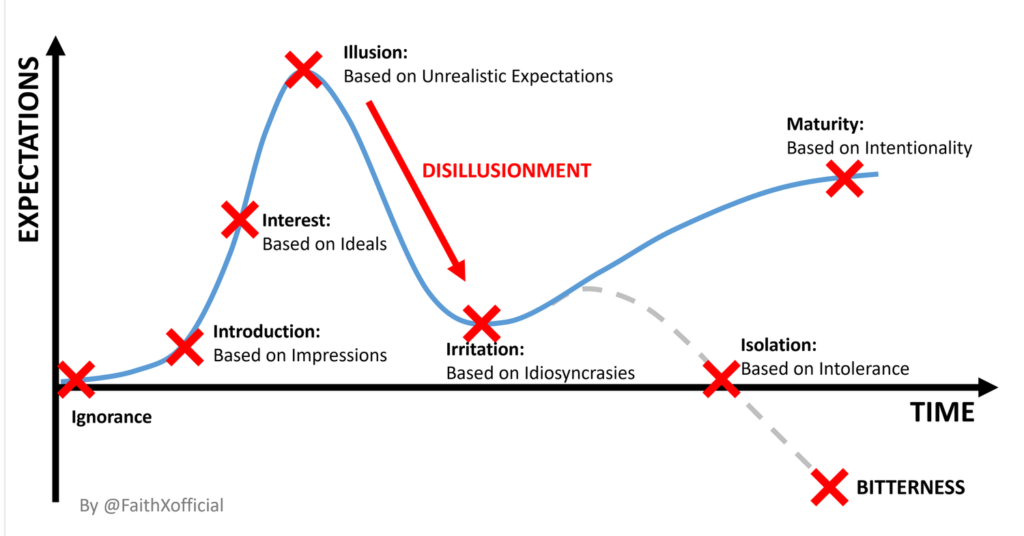Becoming Disillusioned with the Church. Here’s How We Can Help
Dear Pastors,
In my many conversations with Christian friends, I realise that disillusionment with the Church is prevalent in my generation. I feel that we often don’t know what to do with this feeling.

Illusions Come Before Disillusions
Most people in my parents’ generation that I have met, including my parents, converted during their late teens or adulthood. When my parents joined the Church, they were open to the new Christian experience, with little expectations and therefore also little criticism.
Conversely, most youths and young adults in my generation are second generation Christians. I was brought up in Church. I grew up with an unquestioning acceptance of my leaders. After all, my pastors wanted the best for me. So they demonstrated the right character for me to emulate. My pastors used simple words, a big smile and a gentle voice to let me feel loved. I am grateful for that. But I began to have an impossible expectation of the Church and my pastors. I was illusioned.\

When Expectations Burst, We Freefall into Emotional Chaos
Then when I became a teenager, I started to share my ideas for ministry. I realised that my leaders were not ready for my ideas. I also discovered my Church’s bureaucracy and my leaders’ rough edges. Discouragement started to grow. As I learnt more about the way my Church was run, I realised that my church was imperfect and there were decisions that I disagreed with. Over time, my bubble burst. I became disillusioned.
As a teenager, my disillusionment may or may not have been justified. But I didn’t know any better. And I did not know how to handle my deep disappointment. How do I tell my leaders that I feel disappointed with them? Should I even tell my pastor my feelings when he smiles on stage all the time as though nothing is wrong? As my thoughts spiralled into negativity, they became dishonouring, angry and bitter. My heart hardened.

Disillusionment Complicates Teenage Years
When I started asserting my independence as a teenager, I did not only have to wrestle with my own parents’ authority. I had to wrestle with my Pastors, Sunday School teachers and other Church leaders that looked after me. My disillusionment made it harder to submit to my leaders. I began to withdraw from Church altogether. I attended, but I was critical.
Disillusionment is a Cycle
Disillusionment does not happen exclusively with Christians and the Church. Disillusionment happens when the chasm between expectations and reality is too wide to cross.
Human nature seems always to become too idealistic. This happened with the Dot Com Decimation, Crypto Craze and the Metaverse Mania. Gartner created a Hype Curve to demonstrate how predictably idealistic and disillusioned human beings become.

In the same way, I would suggest that there is a predictable Hype Curve for relationships with our spiritual leaders and the Church. We can also use this curve to trace the history of our friendships and romantic relationships.

Disillusionment Presents a Choice
For second generation Christians like me, we were introduced to church at a young age. We developed an interest in the Church based on the ideals we experienced at Sunday School.
After we developed unrealistic expectations, we realised that the Church is flawed. We became irritated with the idiosyncrasies of certain leaders and processes. Then add in teenage strife for identity and independence. That is an emotionally challenging phase to process.
When we fall into disillusionment, we face two difficult options. We can choose to become bitter, or to mature. Bitterness is itself another form of illusion, except that it is a negative spiral.

The Antidote to Disillusionment
When we feel disillusioned, often we want the agreement of others to justify our sentiment. However, such talk quickly makes the atmosphere negative and breeds gossip. Instead, we need to learn how to lament to God.
God indeed hates the proud, but He loves the humble laments of His children, even if those laments turn out to be naive and unfounded (like Job’s complaints). God Himself comforts, corrects, and changes us when we lament to Him. Dear pastors, we need to be taught to lament.
This hymn captures my sentiment:
What a Friend we have in Jesus,
All our sins and griefs to bear!
What a privilege to carry
Everything to God in prayer!
O what peace we often forfeit,
O what needless pain we bear,
All because we do not carry
Everything to God in prayer!
Psalm 42 is a precious psalm of lament. As the psalmist pours his griefs to The Lord, God fills him with hope, and he leaves with a renewed perspective of gratitude, hope and trust in God.
Why are you cast down, O my soul,
and why are you in turmoil within me?
Hope in God; for I shall again praise him,
my salvation and my God.
Psalm 42:11
Godly lament gives us the right spirit to talk through problems. We also get strength and courage to approach our leaders with humility. That is the painful path to maturity.

A Difficult Ask
In hindsight, I wish I knew how to lament to God. I also wish I had someone to process my disillusionment with. I realise that finding a leader to process my disillusionment with might be harder than finding someone to talk about mental health or relational issues.
In the case of mental health issues, I acknowledge that I have imperfections and insecurities. My leader only needs to deal with my problems. Conversely, when processing disillusionment, I would be pointing out what I feel are the imperfections of the Church which challenge any insecurities of my leader.
It takes a deep sense of security and patience to accept a young person’s complaints. These complaints may not even be legitimate problems to begin with, which make them irritating to endure.

A Fruitful Return
But I want to assure Pastors, Sunday School Teachers and Youth Leaders this: Young people understand that it is difficult for anyone to hear complaints, which is why they bottle them up until they leave the Church or explode in ugly ways. Patient listening leaves an indelible mark in their hearts, and it makes them feel deeply appreciated.
Young people think long and hard before they dare to approach you with their complaints. They catastrophize, paralyse and overthink about whether you are in the right mood for a difficult conversation. To allay a young person’s fears, welcome anonymous feedback and avail yourself for an Ask-Me-Anything (AMA) session.
It may take several conversations to process disillusionment, but we can deepen our relationships with our young people when we connect with vulnerable hearts.
~Samuel YC Tan


